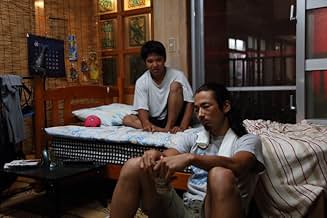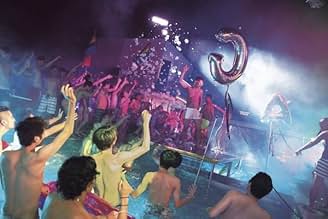Ikari
- 2016
- 2 घं 22 मि
IMDb रेटिंग
7.0/10
3.6 हज़ार
आपकी रेटिंग
अपनी भाषा में प्लॉट जोड़ेंA grisly unsolved murder links three seemingly unrelated stories in three different Japanese cities.A grisly unsolved murder links three seemingly unrelated stories in three different Japanese cities.A grisly unsolved murder links three seemingly unrelated stories in three different Japanese cities.
- पुरस्कार
- 4 जीत और कुल 21 नामांकन
फ़ीचर्ड समीक्षाएं
Great Movie (be aware of some scenes might be very disturbing) that does not hold back any punches. You will be angry, sad, happy and disturbed.
Amazing acting, the movie will keep you guessing and questioning yourself. Its a detective movie and multiple love story at the same time. Movie takes place in 3 different Japanese cities with beautiful cinematography. As you sit on the edge of your seat you wonder about the different scenarios that someone faces in life and how you would react to it.
Truly enjoyable, a movie that you need to dedicate your time to it to understand it. Love it..
Amazing acting, the movie will keep you guessing and questioning yourself. Its a detective movie and multiple love story at the same time. Movie takes place in 3 different Japanese cities with beautiful cinematography. As you sit on the edge of your seat you wonder about the different scenarios that someone faces in life and how you would react to it.
Truly enjoyable, a movie that you need to dedicate your time to it to understand it. Love it..
RAGE is the second attempt of Lee Sang-il, a Japanese filmmaker of Korean extraction, at adapting Shûichi Yoshida's popular novels, the first being VILLAIN (2010), a critical succès d'estime, both films ostensibly inspect the malaise of a contemporary society built upon a lurid murder case.
A couple is cold-bloodedly liquidated in their home, one year later, three strands (taking place in Chiba, Tokyo, and Okinawa respectively) of narratives are cogently intersected when the police corroborate that the suspect has undergone a facelift and is on the lam, all three story lines will be boiled down to a disintegration between the initially unsuspected and the possible perpetrator, and at the same time, the film meticulously keeps dangling audience with its ever-rotating guessing game.
In Chiba, a girl Aiko (Miyazaki) sloughed from a demimonde background by her father Yohei (Watanabe), strikes a relationship with Tetsuya (Matsuyama), a reticent young man with his past concealed; in Tokyo, a self-dependent gay man Yuma (Tsumabuki), lays his eyes on a reedy Naoto (Ayano) in his usual cruising haunt, after their first penetration, Yuma invites a homeless Naoto to live with him, but the latter remains unforthcoming to a fault; in Okinawa, drifter Shingo Tanaka (Moriyama) is hidden on a small island, after chancing upon a newly-arrived young girl Izumi (Hirose) and a local boy Tatsuya (Sakumoto), their fate will go through shifting sands when an unfortunate tragedy occurs.
Thus, Lee plies audience with 3 candidates of the murderer: Tetsuya, Naoto and Shingo, and cunningly teases viewers with alternate possibilities by dint of coalescing these three's attributes into one photoshopped end product (only one revealing shot in the elevator brazenly belies the eventually misled whodunit), actually, the film is not so much a police procedural as a carefully designed weepie gauging the tenuous degree of trust among human interactions, at least in the paralleled stories of Chiba and Tokyo, the issue of trusting the one you love in spite of his carapace hammers home in a treacly manner albeit two terrific performances from Miyazaki and Tsumabuki, the former blends convincingly her unadulterated immaturity with searing vulnerability whereas the latter, palpably inputs something warm, sympathetic and enthralling to flesh out a character very easily teetering on the brink of homosexual platitude. On the other hand, a transcendent Moriyama steals the limelight in the Okinawa chapter, where the film thrusts its "rage" mythos to the fore and reveals something rotten entrenched within (a slap to both islanders and foreigners), but newcomer Takara Sakumoto is unfortunate shy of charisma to match his rival here.
As a matter of fact, acting is the movie's strongest suit because the script itself takes liberty with many wanton coincidences and artistic license to facilitate plot progress, for example, is it really necessary to bluntly play up certain characters' taciturnity as if this is the only way to keep audience hooked without spilling the beans? Also, for my money, the movie errs on the side of being mawkish and blasé, other than taking its aim at a more rapier-like appraisal of its intriguing premise (cause of the crime), Lee's film is awash with sizzling emotions (cheek by jowl with Ryuichi Sakamoto's attendant score) but in the end of the day, it doesn't reach the echelon of superiority as far as the ultimate impact is concerned.
A couple is cold-bloodedly liquidated in their home, one year later, three strands (taking place in Chiba, Tokyo, and Okinawa respectively) of narratives are cogently intersected when the police corroborate that the suspect has undergone a facelift and is on the lam, all three story lines will be boiled down to a disintegration between the initially unsuspected and the possible perpetrator, and at the same time, the film meticulously keeps dangling audience with its ever-rotating guessing game.
In Chiba, a girl Aiko (Miyazaki) sloughed from a demimonde background by her father Yohei (Watanabe), strikes a relationship with Tetsuya (Matsuyama), a reticent young man with his past concealed; in Tokyo, a self-dependent gay man Yuma (Tsumabuki), lays his eyes on a reedy Naoto (Ayano) in his usual cruising haunt, after their first penetration, Yuma invites a homeless Naoto to live with him, but the latter remains unforthcoming to a fault; in Okinawa, drifter Shingo Tanaka (Moriyama) is hidden on a small island, after chancing upon a newly-arrived young girl Izumi (Hirose) and a local boy Tatsuya (Sakumoto), their fate will go through shifting sands when an unfortunate tragedy occurs.
Thus, Lee plies audience with 3 candidates of the murderer: Tetsuya, Naoto and Shingo, and cunningly teases viewers with alternate possibilities by dint of coalescing these three's attributes into one photoshopped end product (only one revealing shot in the elevator brazenly belies the eventually misled whodunit), actually, the film is not so much a police procedural as a carefully designed weepie gauging the tenuous degree of trust among human interactions, at least in the paralleled stories of Chiba and Tokyo, the issue of trusting the one you love in spite of his carapace hammers home in a treacly manner albeit two terrific performances from Miyazaki and Tsumabuki, the former blends convincingly her unadulterated immaturity with searing vulnerability whereas the latter, palpably inputs something warm, sympathetic and enthralling to flesh out a character very easily teetering on the brink of homosexual platitude. On the other hand, a transcendent Moriyama steals the limelight in the Okinawa chapter, where the film thrusts its "rage" mythos to the fore and reveals something rotten entrenched within (a slap to both islanders and foreigners), but newcomer Takara Sakumoto is unfortunate shy of charisma to match his rival here.
As a matter of fact, acting is the movie's strongest suit because the script itself takes liberty with many wanton coincidences and artistic license to facilitate plot progress, for example, is it really necessary to bluntly play up certain characters' taciturnity as if this is the only way to keep audience hooked without spilling the beans? Also, for my money, the movie errs on the side of being mawkish and blasé, other than taking its aim at a more rapier-like appraisal of its intriguing premise (cause of the crime), Lee's film is awash with sizzling emotions (cheek by jowl with Ryuichi Sakamoto's attendant score) but in the end of the day, it doesn't reach the echelon of superiority as far as the ultimate impact is concerned.
Saw this film at TIFF (Toronto International Film Festival) yesterday. It is a somewhat lengthy Japanese film (2+ hrs) with strong acting and interesting storyline. Most films covering similar topics--unsolved crime, mysterious loner, young lovers, homosexual relationship--would have ended up clichéd and boring after an hour but this film definitely kept me interested throughout.
Unfortunately, I feel the ending weakens the film. The way the crime details were revealed at the end seemed rushed and wasn't as imaginative as the rest of film. Overall, a good film worth watching if you are looking for a foreign film with crime drama plot.
Unfortunately, I feel the ending weakens the film. The way the crime details were revealed at the end seemed rushed and wasn't as imaginative as the rest of film. Overall, a good film worth watching if you are looking for a foreign film with crime drama plot.
Rage (Ikari) is a Japanese suspense mystery drama film directed by Lee Sang-il and based on Shuichi Yoshida's mystery novel, following the same creative partnership behind their recent highly anticipated film Kokuho (National Treasure).
The film weaves together parallel narratives - the hunt for a murderer across three locations and the intimate examination of trust and human connection - creating a complex exploration of both mystery and the fragility of human relationships.
"The request was for one theme, one motivational motif that would start out sounding like 'distrust' and gradually transform into 'trust' as the film progressed," says Sakamoto.
"What the director most wanted to explore was this human dynamic between distrust and trust - whether some form of love could emerge from that tension. It seems that's where his focus was."
Through many exchanges with the director and his persistent creative demands, Sakamoto crafted music that masterfully captures the complex emotional depths of modern humanity.
The melody repeats the same phrase while evolving gradually, enveloping the anger and grief that live within the film and transforming it into beautiful music.
"This time, I went to Seattle to record the live string parts with the same musicians who played on 'The Revenant.' We got a really good sound and great performances.
For 'Rage,' while it has elements similar to 'The Revenant,' I tried to create something with a broader range of listening possibilities.
Since I have this work, I want to go up the stairs one by one, even if they're small steps, so that's how I approach it.
Review written by artist jayakumar.
The film weaves together parallel narratives - the hunt for a murderer across three locations and the intimate examination of trust and human connection - creating a complex exploration of both mystery and the fragility of human relationships.
"The request was for one theme, one motivational motif that would start out sounding like 'distrust' and gradually transform into 'trust' as the film progressed," says Sakamoto.
"What the director most wanted to explore was this human dynamic between distrust and trust - whether some form of love could emerge from that tension. It seems that's where his focus was."
Through many exchanges with the director and his persistent creative demands, Sakamoto crafted music that masterfully captures the complex emotional depths of modern humanity.
The melody repeats the same phrase while evolving gradually, enveloping the anger and grief that live within the film and transforming it into beautiful music.
"This time, I went to Seattle to record the live string parts with the same musicians who played on 'The Revenant.' We got a really good sound and great performances.
For 'Rage,' while it has elements similar to 'The Revenant,' I tried to create something with a broader range of listening possibilities.
Since I have this work, I want to go up the stairs one by one, even if they're small steps, so that's how I approach it.
Review written by artist jayakumar.
It's a very emotional movie which touches on a few rather uncomfortable, unpleasant and tragic real life subjects. The acting is really good. Unfortunately the plot writing is a bit of a weak point. It's not very creative or believable. Also, some of the protagonists' reactions to the events taking place don't make much sense in terms of realism and only seem to serve for increasing dramatic effect.
क्या आपको पता है
- साउंडट्रैकM21 Forgiveness
Written by Ryuichi Sakamoto
Performed by Ryuichi Sakamoto feat. 2Cellos
Courtesy of Sony Music Japan International
टॉप पसंद
रेटिंग देने के लिए साइन-इन करें और वैयक्तिकृत सुझावों के लिए वॉचलिस्ट करें
- How long is Rage?Alexa द्वारा संचालित
विवरण
बॉक्स ऑफ़िस
- दुनिया भर में सकल
- $1,35,21,593
- चलने की अवधि
- 2 घं 22 मि(142 min)
- रंग
- ध्वनि मिश्रण
- पक्ष अनुपात
- 2.35 : 1
इस पेज में योगदान दें
किसी बदलाव का सुझाव दें या अनुपलब्ध कॉन्टेंट जोड़ें




























